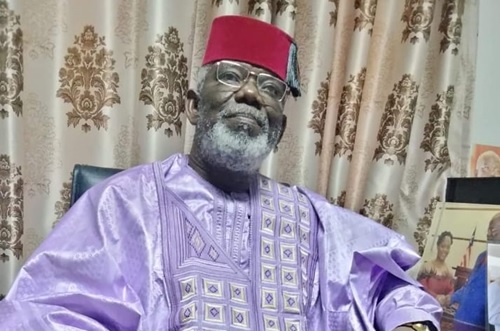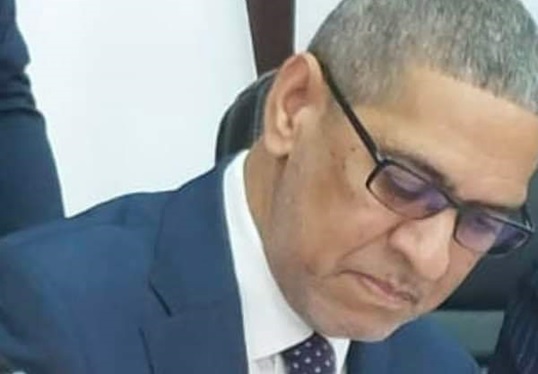MONROVIA, LIBERIA – Senator Prince Yormie Johnson, a divisive figure in Liberian politics and former warlord, has passed away at the age of 72. Family sources report that Johnson fell into a coma before being declared dead. This news was confirmed by close relatives to the late Senator.
Born on July 6, 1952, in Tapeta, Nimba County, Johnson’s life was marked by controversy and complexity. Raised in Monrovia by his uncle, he enlisted in the Liberian National Guard (LNG) in 1971, which later became the Armed Forces of Liberia (AFL). Known for his strict discipline, Johnson quickly rose to the rank of lieutenant, receiving military training both in Liberia and the United States.
Johnson’s association with General Thomas Quiwonkpa, a key figure in the opposition to President Samuel Doe’s regime, significantly influenced his future. When Quiwonkpa was exiled after being accused of plotting a coup against Doe, Johnson followed him into exile. This marked the beginning of his resistance against Doe’s government, which ultimately led to his involvement in the First Liberian Civil War.
In 1989, Johnson joined Charles Taylor’s National Patriotic Front of Liberia (NPFL) as its Chief Training Officer. However, a power struggle with Taylor led to Johnson’s break from the NPFL, and he formed his own faction, the Independent National Patriotic Front of Liberia (INPFL). Under his leadership, the INPFL captured substantial parts of Monrovia, setting the stage for one of the most notorious events in Liberia’s history.
On September 9, 1990, Johnson’s forces captured President Samuel Doe, and in a horrifying act, he ordered Doe’s torture and execution, watching as the brutal act unfolded while sipping beer. The footage of this shocking event, broadcast globally, cemented Johnson’s notoriety as one of Liberia’s most infamous warlords.
Despite his violent past, Johnson briefly claimed the presidency before being driven into exile by Charles Taylor’s rise to power. He fled to Nigeria in 1992, where he reportedly underwent a transformation. During his time in exile, Johnson became a born-again Christian, reconciled with the Doe family, and began preaching under the mentorship of Nigerian pastor T.B. Joshua.
Johnson returned to Liberia in 2004 after the Second Liberian Civil War, marking the beginning of his political career. He was elected to the Senate in 2005, representing Nimba County, a testament to his continued popularity among his constituents. Many saw him as a protector of their interests, and he soon became a key figure in the country’s political landscape.
As a senator, Johnson was known as the “political godfather” of Nimba County. He founded several political parties, including the National Union for Democratic Progress (NUDP) in 2010 and the Movement for Democracy and Reconstruction (MDR) in 2016. His influence was significant, often acting as a kingmaker in national elections.
Johnson ran for president in 2011 and 2017, but was unsuccessful, finishing third and fourth, respectively. However, his endorsement of George Weah in the 2017 run-off was pivotal in Weah’s victory. By 2022, Johnson withdrew his support for Weah, citing dissatisfaction with Nimba County’s lack of representation in key government positions.
Johnson’s political career was not without controversy. In 2009, the Truth and Reconciliation Commission (TRC) recommended a 30-year ban on him from holding public office due to his role in the civil war. Johnson dismissed the TRC’s findings as biased, and a later ruling by the Supreme Court declared these recommendations unconstitutional.
In 2021, Johnson faced new challenges when the U.S. Department of Treasury sanctioned him for alleged corruption, accusing him of engaging in vote-buying. Despite these allegations, Johnson remained a dominant political figure in Nimba County, winning re-election to the Senate in 2014 and 2023.
Beyond politics, Johnson was also the head pastor of the Christ Chapel of Faith Ministry in Paynesville. He used this platform to combine religious teachings with political rhetoric, portraying himself as both a spiritual and political leader.
Johnson’s leadership was polarizing. While some viewed him as a war criminal, others saw him as a pragmatic leader who fought for his people’s interests. His ability to navigate Liberia’s complex political environment, despite his controversial past, underscored his resilience and adaptability.
Johnson’s death marks the end of an era in both Nimba County and Liberia. His influence on the nation’s political and social dynamics will leave a lasting legacy that will continue to be debated for years to come.
Vice President Jeremiah Koung, who was both a close ally and protégé of Johnson, responded to the news with a simple but meaningful statement: “Jesus.” This brief reaction reflects the deep personal and political bond that Johnson and Koung shared over the years.
Prince Yormie Johnson’s passing has left a void in in Nimba’s politics. As Nimba and country reflect on his life, his legacy will continue to provoke mixed emotions—a reminder of the country’s tumultuous history and its ongoing path toward peace and reconciliation.







